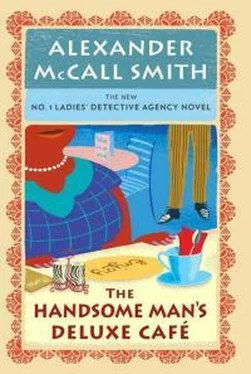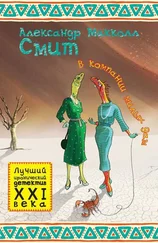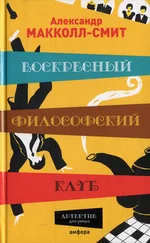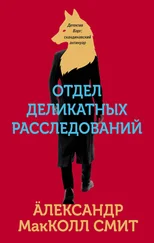She lowered herself dispiritedly into her seat. ‘It is all over,’ she said, her voice flat and without emotion. ‘Everything is finished now.’
Mma Ramotswe, who had been examining a set of suspect receipts passed on by a client, pushed the papers aside. ‘Mma?’ she said with concern. ‘What is it, Mma?’
There was defeat in Mma Makutsi’s voice. ‘This. The paper. Today.’ She held out the folded newspaper, which Charlie took and passed on to Mma Ramotswe.
She knew what it was before she read it. This would be the review of the Handsome Man’s De Luxe Café by the self-appointed restaurant critic and markedly undistinguished graduate of the Botswana Secretarial College, Violet Sephotho. Mma Makutsi was right; this was the end.
Our renowned restaurant critic visits a new establishment! shouted the headline on the front page. See page 6 for the full story .
With the air of one who dreads what she is about to read, Mma Ramotswe turned to page six.
De Luxe? the review began. Not in my dictionary! Of course anybody can call a business anything these days and get away with it. Anything at all. There’s a place in town that calls itself the No. 1 Ladies’ Detective Agency. Says who? What about the CID? What about the FBI? They may have something to say about that claim. So when an outfit sets up calling itself the Handsome Man’s De Luxe Café, the warning bells sound loud and clear. Who are these handsome men? Where’s the luxe? When I went there, there were certainly no handsome men – and I even looked under the tables to make sure. There were a few men around, but even their mothers would not have described them as handsome. So that was a bad start – in my view, at least.
And then it got worse. The waiter appeared and took my order. I’m not sure if you can write things down correctly when you’re drunk, but at least he tried. I had to help him to spell sausage, which is not a good sign. If there’s one thing a waiter should be able to do, it’s to spell s-a-u-s-a-g-e.
I looked around the place. The less said about the décor, the better. Next time I go there – not that there’s likely to be a next time – I’ll take a tin of paint with me and try to sort out the places where the painter forgot to go: all part of the service!
My food took thirty-eight minutes to arrive – I timed it. I was hungry by then, but not hungry enough to eat what was put before me; you’d have to be starving to eat anything at this place. Better to go hungry than to spend the next few days sick, I always say!
I looked at the food and smelled it. Ladies and gentlemen, don’t go there – just don’t go there! So here are my scores (out of ten) for the Handsome Man’s De Luxe Café: atmosphere: zero; décor and cleanliness: zero; service: minus one; food: minus ten. Believe me – give this place a very wide berth (five miles, to be on the safe side)! VS.
Mma Ramotswe finished reading and laid the newspaper down on her desk. She looked at Mma Makutsi, whose large round glasses were flashing out a message that was hard to interpret but could hardly be cheerful.
‘Not a good review?’ asked Charlie.
Neither answered him. Then Mma Ramotswe said, ‘That woman is full of venom, Mma. She is like a snake.’
‘Snakes do not write in the newspapers,’ muttered Mma Makutsi. ‘That is the difference. Snakes cannot harm you by what they write.’
Charlie had now picked up the newspaper and was working his way through the review. ‘Ow!’ he exclaimed. ‘This is one big lie, Mma. People will see that. They’ll know who this VS is.’
‘No, they won’t,’ said Mma Makutsi. ‘They won’t know who she is and they’ll believe every word of it.’ She paused before continuing. ‘I am finished now. I have wasted all that money of Phuti’s and for nothing. I have discovered something about the chef and the waiter. And the waitress, too.’
Mma Ramotswe suspected what was coming, but waited to hear it.
‘They are all related,’ said Mma Makutsi. ‘He dropped his omang on the floor when he went out to the stores and I picked it up. I saw his real name. I asked the waiter, and he told me everything. He was drunk and had had a fight with his father. He told me everything. He is not a real chef. My lawyer is his brother and always tries to help him, but it never works… And now they have all handed in their notice and said that they have had enough, and so there is nobody to run the restaurant. It’s the end, Mma Ramotswe – it’s the end.’
Mma Ramotswe grimaced. It was difficult to see what could be done and she felt at a loss as to what to say to Mma Makutsi. Should she recommend that she simply walk away from the business; that she close it down and cut her losses rather than letting them mount up? What if she advertised for replacements and found another set of these types, every bit as bad as the last lot?
Mma Makutsi needed help, and she could not provide it. Her thoughts turned to Mma Potokwani. Catering was something she knew about, and was good at. Was there a chance – just a chance? She glanced at her watch. It would take them twenty minutes or so to get out to the Orphan Farm and when they arrived she imagined Mma Potokwani would be ready to serve tea and fruit cake. Mma Makutsi and Mma Potokwani had had their differences in the past, but there was no doubt of Mma Potokwani’s ability to deal with a crisis.
‘I think we should go for a drive,’ she said to Mma Makutsi. ‘There’s no point sitting here and brooding.’
‘I’m finished,’ said Mma Makutsi. ‘There’s no point in doing anything.’
Mma Ramotswe rose to her feet. ‘Never say that, Mma.’
‘But it’s true,’ said Mma Makutsi. ‘I am a big failure, Mma.’
Charlie, his sympathy engaged by the outrageous review, shook his head vigorously. ‘No, Mma, you are not a failure. Ninety-seven per cent – remember?’
‘That was a long time ago,’ she muttered. ‘This is different. This is a… a whole new area of failure.’
There was no point in wallowing in misery, thought Mma Ramotswe. ‘Come on, now, Mma,’ she coaxed. ‘Let’s go somewhere where we can look calmly at what you might do.’
Mma Makutsi rose from her desk. ‘A big failure,’ she muttered, to nobody in particular. ‘That’s me.’
Nobody else heard it – but she did: from down below, at floor level, came the voice of her shoes, a voice that was at the same time tiny and crowing.
We warned you, Boss. Did you listen to us? You did not. Result? Failure – big time!
The children were singing when they arrived. That’s something, thought Mma Ramotswe – the sound of children’s voices was a reminder that however bad things might look, they were not as bad as all that. Children’s singing is like the light; or like the much-needed rain at the end of a drought. It is the thing that will comfort us and remind us that there is good in the world, and hope, too.
‘Listen to that,’ said Mma Ramotswe, as they got out of the van. ‘Listen to that lovely song, Mma Makutsi. That is one that we sang ourselves, isn’t it? All about a bird that looks after the fields when the people are away and warns them when the locusts try to eat the crops.’
Mma Makutsi made a non-committal sound.
‘Yes,’ said Mma Ramotswe breezily, ‘it is the same song. That was a very helpful bird, that one.’
‘Maybe,’ said Mma Makutsi. Then she muttered: ‘There are no helpful birds – not in real life.’
They walked over to the block where Mma Potokwani had her office. When they knocked, they could hear voices within. Mma Potokwani’s assistant came out to greet them. ‘She’s busy right now,’ she said, ‘but she will be ready to see you in a few minutes. I can fetch you tea, Mma Ramotswe – or you can wait until Mma Potokwani is ready.’
Читать дальше







![Александр Макколл Смит - Отдел деликатных расследований [litres]](/books/397661/aleksandr-makkoll-smit-otdel-delikatnyh-rassledova-thumb.webp)




